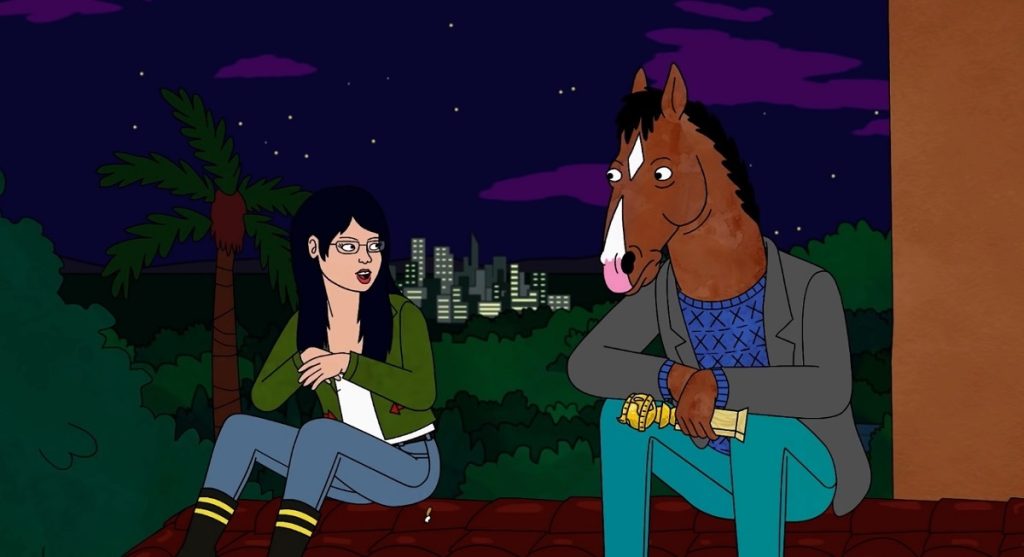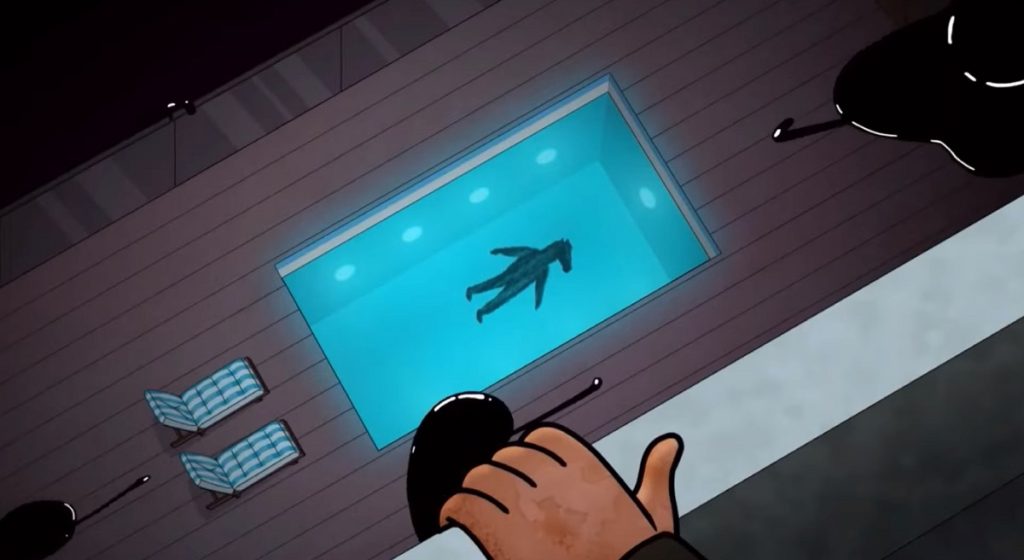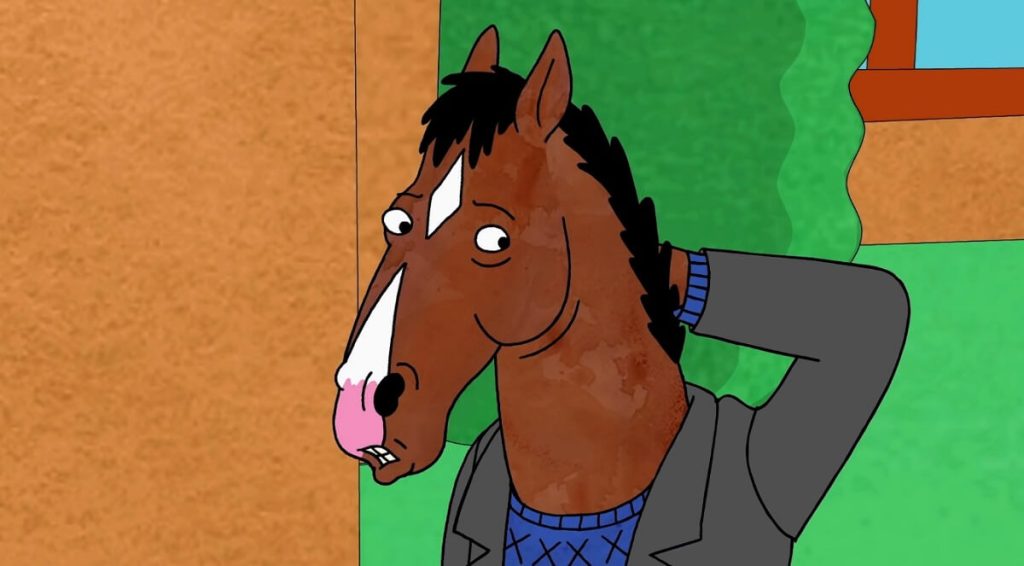One of the most surprising twists in the show’s later seasons is when BoJack go to jail. This shocking development left many fans bewildered and wondering: what led to BoJack’s imprisonment?
In this article, we’ll investigate the events and decisions that led to BoJack’s incarceration, exploring the key moments and choices that contributed to his downfall and eventual arrest.
The Crime That Led to BoJack’s Jail Time
In the final episode of BoJack Horseman, the titular character finds himself sentenced to 14 months in prison for breaking into his old Hollywood home. The pivotal moments include BoJack being discovered unconscious in the pool by the new homeowners, who rescue him from drowning. This break-in leads to BoJack receiving a 14-month prison term. The episode then fast-forwards a year into his incarceration, showing BoJack being granted a day release to attend his friend Princess Carolyn’s wedding. Although the series doesn’t depict BoJack completing his entire sentence, his prison time underscores the severe repercussions of his reckless behavior and poor decisions throughout the show.
What Was the Worst Thing BoJack Did?
One of the most egregious acts committed by BoJack in the show “BoJack Horseman” was waiting 17 minutes before seeking help when Sarah Lynn overdosed. This delay highlighted his selfishness and disregard for others’ well-being. Beyond this, BoJack’s misconduct encompassed:
- Emotionally manipulating and exploiting the loyalty of close friends such as Diane, Princess Carolyn, and Todd.
- Engaging in self-destructive behaviors like substance abuse and binge drinking, posing risks to himself and those in his vicinity.
- BoJack also engaged in serious misconduct, including having inappropriate relations with his friend’s underage daughter, Candy, and exploiting problematic power dynamics with his autobiography ghostwriter.
- He also sabotaged others’ chances at happiness out of jealousy, as seen in his actions towards Herb Kazzaz.
At his core, BoJack’s most significant flaw was his overwhelming selfishness and lack of empathy. His behavior consistently inflicted harm on those around him, trapping him in a cycle of pain and regret from which he struggled to escape.
The Tragic Demise of Sarah Lynn
Sarah Lynn’s narrative in BoJack Horseman starkly portrayed the harsh realities of child stardom and substance abuse. Initially depicted as carefree, her downward spiral began with an overbearing mother pushing her into acting against her wishes to become an architect. Compounded by the traumatic experience of being sexually assaulted by her stepfather, Sarah Lynn’s life became a cautionary tale illustrating how the toxic entertainment industry can strip children of their innocence and dreams.

What Were Sarah Lynn’s Last Words?
In a deeply moving scene from the episode “That’s Too Much, Man!”, Sarah Lynn’s final words are “I wanna be an architect,” spoken while she watches a planetarium show with her head resting on BoJack’s shoulder. This poignant statement highlights the childhood dream that was overshadowed by the relentless pressures of fame thrust upon her at a young age.
Her last words underscore the tragic trajectory of her life—a dream deferred by circumstances beyond her control. Sarah Lynn’s life ended prematurely on February 28, 2016, at the age of 31, due to a heroin overdose. Her death, depicted in the eleventh episode of season three, aired in July 2016, serves as a sobering reflection of her shattered dreams.
BoJack’s Worst Offenses Beyond the Jail Time
BoJack Horseman’s time in jail was just one of the many consequences of his actions. His story is filled with a range of troubling behaviors and decisions that extend far beyond his imprisonment. One of the most damning episodes in his series of offenses was his reaction to Sarah Lynn’s overdose.
Why Did BoJack Wait 17 Minutes?
The shocking revelation that BoJack Horseman waited 17 minutes before calling for help during Sarah Lynn’s overdose was a pivotal moment that shifted public perception of him. Initially, viewers sympathized with BoJack’s personal struggles. However, this delay in seeking medical assistance unveiled a darker side of his character: his selfishness and willingness to prioritize his own interests over someone else’s life.
There are two possible explanations for this troubling delay. One is that BoJack sought to conceal his own complicity in Sarah Lynn’s addiction, hoping to avoid blame. The other is that he was so impaired by drugs that he unconsciously postponed getting help. Regardless of the reason, the 17-minute wait starkly revealed BoJack’s moral shortcomings and his readiness to let someone suffer, potentially fatally, in order to safeguard his own reputation and avoid facing consequences.
This incident, among others, highlights how BoJack’s behavior was not just a series of missteps but a pattern of self-destructive and harmful actions that deeply affected those around him.
The Ambiguous Ending of BoJack Horseman
BoJack Horseman does not die in the Netflix animated series. The show concludes on an ambiguous note, leaving BoJack’s ultimate fate uncertain.

In the series finale episode “Nice While It Lasted,” BoJack attends Princess Carolyn’s wedding after being temporarily released from prison. During the reception, BoJack has a heartfelt conversation with Diane, where he seems to find a sense of inner peace and acceptance regarding his flaws and past mistakes.
What BoJack’s Story Teaches Us?
The final scene shows BoJack leaving the wedding and walking alone into the darkness, leaving his future open-ended. His narration reflects this uncertainty:
“I was a TV legend, a movie star, a punchline, a felon. But life is a thing that keeps happening as long as you keep getting up in the morning. Maybe I’ll go to work on one of Princess Carolyn’s shows. Maybe I’ll go teach at a tiny theater school and sleep on a dinghy like Charlie Chaplin. I don’t know. The universe is a cruel, uncaring void. The key to being happy isn’t a search for meaning; it’s to just keep yourself busy with unimportant nonsense, and eventually, you’ll be dead.”
Throughout the series, BoJack’s journey to prison highlights the importance of facing the consequences of our destructive actions and taking responsibility. His story is filled with sadness, yet it also demonstrates the potential for personal growth and change, even in the darkest of times. As the show concludes, viewers are left hoping that BoJack’s time in prison will lead to his growth as a person, guiding him toward a life of kindness, honesty, and care for others.



